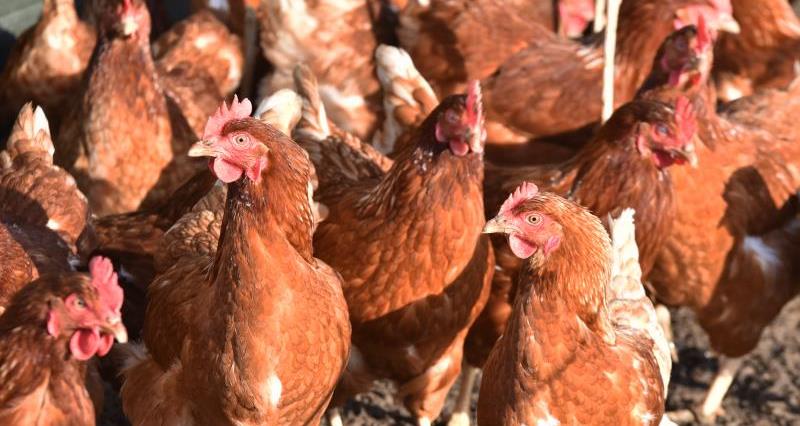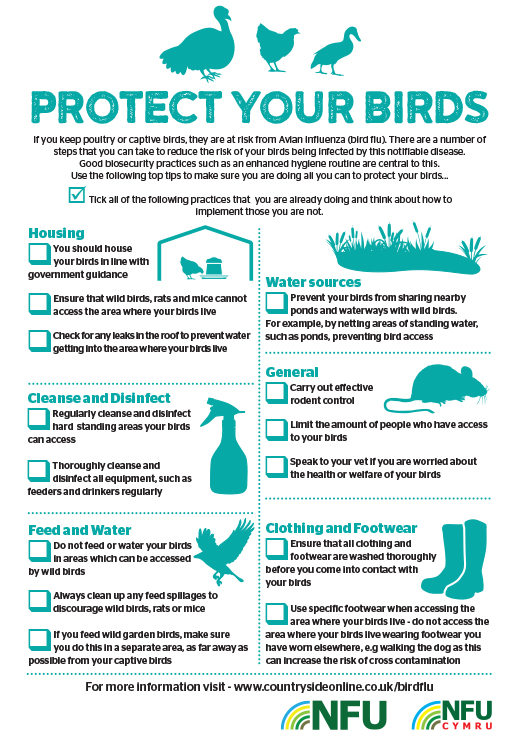Current avian influenza risk levels
Keep up to date with the latest guidance on avian influenza at GOV.UK | Avian influenza (bird flu)
Avian influenza case finder
Keep up to date with cases using our AI case finder. It is a simple look up tool, that allows you to find any cases at any particular location. You can search for cases near you and find key details about current and lifted cases, including information on disease control zones.
Tips to help protect your birds
We have put together some top tips to help you keep your birds safe!
- Have designated footwear for entering your birds’ enclosures
- Regularly cleanse and disinfect surfaces such as chicken coops, feeding trays and water dispensers
- Have a designated fenced off area for your birds to limit their interaction with wild birds
- Prevent your birds from sharing nearby ponds and waterways with wild birds. For example, by netting areas of standing water, such has ponds and preventing bird access.
- Clean any feed spills to discourage rodents and wild birds
- Ensure to wash your hands thoroughly after any interaction with your birds
- Register your birds online to keep up to date on disease outbreaks so you can keep your birds safe click here to register
Useful biosecurity resources
The NFU's biosecurity poster is a useful tool to visually see biosecurity measures. Download, print and share copies with poultry keepers so we can all keep birds safe.
How to spot avian influenza
There are 2 types of avian influenza – High Pathogenicity (HPAI) or Low Pathogenicity (LPAI). HPAI is the more serious type. It is often fatal in birds. The main clinical signs of HPAI in birds are:
- swollen head
- blue discolouration of neck and throat
- loss of appetite
- respiratory distress such as gaping beak, coughing, sneezing, gurgling, rattling
- diarrhoea
- fewer eggs laid
- increased mortality
Clinical signs can vary between species of bird and some species (for example, ducks and geese) may show minimal clinical signs.
Low pathogenic avian influenza (LPAI) is usually less serious. It can cause mild breathing problems, but affected birds will not always show clear signs of infection. The severity of LPAI depends on the type of bird and whether it has any other illnesses. Anyone who keeps poultry must keep a close watch on them for any signs of disease, and must seek prompt advice from their vet if they have any concerns. Avian Influenza is a notifiable disease meaning it is a legal requirement to report any suspicion of disease.
How is bird flu spread?
Bird flu (Avian Influenza) is spread by direct contact between birds, and through contamination in the environment, for example in bird droppings. This means wild birds carrying the disease can infect domestic poultry, so the best way to reduce the risk of your poultry catching bird flu is to minimise the chance of them coming into contact with wild birds or their droppings by practising good biosecurity and safety measures.
The winter means a reduction in natural foods so wild birds will seek out poultry feed and water during the tough months, and migratory birds begin to arrive from the Continent.
To help prevent the spread of the disease it is important to review the biosecurity measures that are in place in the flock currently. This in turn will protect your own flock, other backyard farmers and support British poultry. Below are pointers of how to achieve high levels of biosecurity.
Keeping in touch
To receive the latest news and advice should there be a Bird Flu outbreak, poultry keepers can sign up to the APHA poultry register. The NFU recommends that anyone with poultry or captive birds, no matter how many are in the flock, should register for free by clicking here or via the helpline on 03000 200 301.
What if you suspect an outbreak?
If you suspect Avian Influenza in your flock, please contact your vet immediately.
If a member of the public finds dead wild waterfowl (swans, geese or ducks) or other dead wild birds, such as gulls or birds of prey, they should not touch them and report them to the Defra helpline: 03459 33 55 77.


